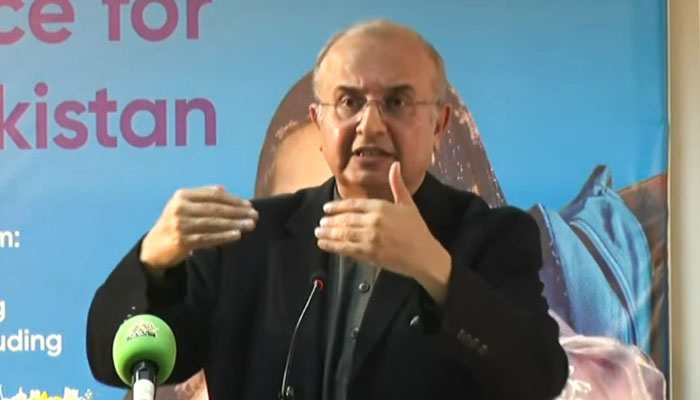Justice Mansoor Ali Shah calls for ‘Judicial Silk Route’
Justice Shah emphasises significance of adopting advanced legal frameworks inspired by Chinese practices
ISLAMABAD: Justice Mansoor Ali Shah of the Supreme Court has called for the establishment of a “Judicial Silk Route” between China and South Asia to strengthen legal collaboration and create effective dispute resolution mechanisms under the Belt and Road Initiative (BRI) and the China-Pakistan Economic Corridor (CPEC).
Justice Shah was speaking at a consultative roundtable on “A holistic assessment of legislative reform, investment protection and dispute resolution under CPEC” co-organised here by the Institute of Regional Studies (IRS) and Centre for Chinese Legal Studies at LUMS. Justice Shah emphasised the significance of adopting advanced legal frameworks inspired by Chinese practices.
He underscored the need to establish BRI commercial mediation centres and develop domestic commercial courts to facilitate investment protection and dispute settlement in Pakistan. He added that such measures would not only address Pakistan’s reliance on litigation but also make the country more investor-friendly.
Justice Jawad Hassan emphasised Pakistan’s legal and constitutional advancements supporting the implementation of CPEC, now approaching its third phase. He praised the formation of Special Investment Facilitation Council (SIFC) as a crucial measure to boost investor confidence. He underscored the importance of arbitration and mediation in efficiently resolving legal challenges, especially in large-scale projects like CPEC.
He also commended Pakistan’s recent accession to the Singapore Convention on Mediation, describing it as a progressive step that reinforces the country’s commitment to alternative dispute resolution practices.
Dr Sikander Ahmed Shah, Director, Centre for Chinese Legal Studies, LUMS, highlighted the need to build mutual trust and understanding between Pakistan and China. He noted that their partnership extends beyond infrastructure projects, symbolising friendship and shared objectives. He asserted that the lasting nature of this relationship should underpin collaborative efforts to tackle legal and policy challenges, ensuring the partnership’s long-term success.
Mr. Khalid Taimoor Akram, Executive Director, Pakistan Research Centre for A Community with Shared Future, pointed out that Pakistan’s strategic location makes it a vital transit route for China and landlocked Central Asian states. However, he noted the absence of a comprehensive legal framework to govern these projects effectively. Drawing attention to the region’s limited ADR facilities, with Kazakhstan hosting the only such centre, he urged Pakistan to establish its own ADR mechanisms to address disputes efficiently.
Dr Tariq Mahmood, barrister and arbitrator, discussed international arbitration standards and the integration of ADR practices to meet the demands of cross-border investments.
Riffat Inam Butt, Secretary, Law and Justice Commission of Pakistan, stressed judicial efficiency and policy alignment to facilitate investment security and sustainable growth.
Jauhar Saleem, President, IRS, highlighted concerns regarding the lack of institutional capacity to handle complex legal contracts for large-scale infrastructure projects. He said there is urgent need to enhance Pakistan’s legal and institutional frameworks to eliminate ambiguities and ensure effective implementation of CPEC initiatives.
-
 'The Wrong Paris' Star Veronica Long Shares What New Crime Series 'Blue Skies' Is About
'The Wrong Paris' Star Veronica Long Shares What New Crime Series 'Blue Skies' Is About -
 King Charles Remains Immersed In Work Amid Andrew Scrutiny
King Charles Remains Immersed In Work Amid Andrew Scrutiny -
 Bobby J. Brown's Passing Adds To Growing List Of Celebrity Deaths In 2026
Bobby J. Brown's Passing Adds To Growing List Of Celebrity Deaths In 2026 -
 Prince William Fears For Andrew's Mental Health
Prince William Fears For Andrew's Mental Health -
 Paige DeSorbo Breaks Silence On New Relationship With Joe D'Amelio
Paige DeSorbo Breaks Silence On New Relationship With Joe D'Amelio -
 'Marshals' Showrunner Reveals If Kayce And Beth Will Cross Paths In 'Yellowstone' Spinoff
'Marshals' Showrunner Reveals If Kayce And Beth Will Cross Paths In 'Yellowstone' Spinoff -
 Belgium Watchdog Launches Antitrust Probe Into Google Ads Business
Belgium Watchdog Launches Antitrust Probe Into Google Ads Business -
 Andrew Ready To Fight Back: 'He's Very Vengeful'
Andrew Ready To Fight Back: 'He's Very Vengeful' -
 After Surpassing 100 Million YouTube Subscribers, BLACKPINK Returns With New Release
After Surpassing 100 Million YouTube Subscribers, BLACKPINK Returns With New Release -
 Rihanna Sends Fans Into Frenzy With BTS Footage Of Music Making: Watch
Rihanna Sends Fans Into Frenzy With BTS Footage Of Music Making: Watch -
 More Americans Say They Sympathise With Palestinians Than Israelis, Poll Finds
More Americans Say They Sympathise With Palestinians Than Israelis, Poll Finds -
 Princess Finally Releases Meghan Markle, Prince Harry's Photos
Princess Finally Releases Meghan Markle, Prince Harry's Photos -
 Victoria Beckham Makes Exciting Announcement Amid Ongoing Rift With Brooklyn Beckham
Victoria Beckham Makes Exciting Announcement Amid Ongoing Rift With Brooklyn Beckham -
 King Charles Receives Major Blow After Meghan Markle, Harry's Trip
King Charles Receives Major Blow After Meghan Markle, Harry's Trip -
 Kate Middleton Apologizes After Her Umbrella Bumps Child's Head
Kate Middleton Apologizes After Her Umbrella Bumps Child's Head -
 Retired US Fighter Pilot Arrested Over Alleged Training Of Chinese Military
Retired US Fighter Pilot Arrested Over Alleged Training Of Chinese Military




